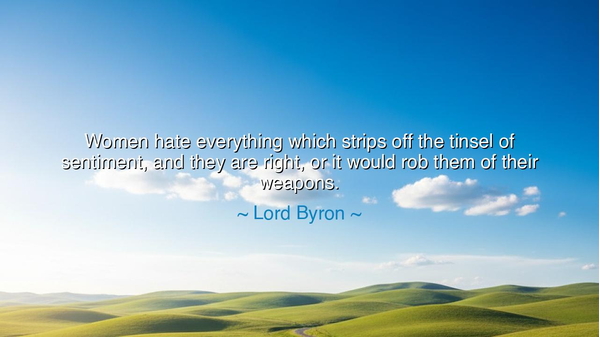
Women hate everything which strips off the tinsel of sentiment
Women hate everything which strips off the tinsel of sentiment, and they are right, or it would rob them of their weapons.






The words of Lord Byron, “Women hate everything which strips off the tinsel of sentiment, and they are right, or it would rob them of their weapons,” are spoken with the sharp tongue of a poet who understood both passion and irony. He suggests that sentiment, though fragile and adorned like tinsel, is no mere decoration. For women, often denied the brute weapons of power and authority, sentiment itself became their armor and their blade—the means by which they influenced hearts, swayed decisions, and secured dignity in a world that denied them open strength.
The origin of this thought lies in the world Byron inhabited—an age when women were excluded from politics, war, and public life, yet held sway in salons, in letters, and in the chambers of affection. Deprived of direct authority, they wielded the tools society allowed them: charm, romance, and emotional influence. To strip away sentiment would have been to deny them even this, leaving them defenseless in the contests of love and power. Byron, with his keen eye for paradox, recognized the justice of their attachment to it.
Consider the story of Josephine Bonaparte, wife of Napoleon. She had little political authority, yet through grace, tact, and the shimmering veil of sentiment, she softened her husband’s temper and secured alliances through her presence. Many mocked her reliance on charm and romance, but without it, she would have been powerless in the face of an empire’s machinery. Her “tinsel” was in fact her weapon, turning vulnerability into influence.
Byron’s words also reveal a hidden respect within his irony. For while he calls sentiment “tinsel,” he acknowledges that it is not to be dismissed, for it has real power. What others might deride as weakness or frivolity, he names as strategy. In a world where men drew swords and passed laws, women carved their victories through the realm of feeling, perception, and beauty. Their weapons were unseen, but no less effective.
The lesson for generations is clear: never mistake softness for weakness, nor sentiment for emptiness. The adornments of feeling, of romance, of tenderness, have moved armies, ended wars, and reshaped nations. Those who scorn such forces fail to see that human life is ruled as much by the heart as by the hand.
Let future generations remember: power takes many forms. If men once held the sword, then women often held the subtler, more enduring blade—sentiment, wielded not in conquest but in persuasion. And though Byron names it “tinsel,” he concedes that without it, they would have been robbed of their strength. Thus, what seems delicate may in truth be indestructible, the hidden weapon of those denied every other.






MTle nguyen minh thuy
Lord Byron’s view on women’s sentimentality being a weapon is both intriguing and problematic. While it's true that emotions can be powerful, to suggest that women’s feelings are merely tools for manipulation feels reductive. Do women truly use sentiment as a weapon, or is it society’s framing of women as emotionally driven that perpetuates this stereotype? How can we create a more nuanced understanding of sentiment and emotional expression in both genders?
NYBui nhu Y
Byron’s quote touches on the intersection of emotion and power in a very controversial way. It seems to suggest that women’s emotional depth is just a form of defense or manipulation. But is sentiment really a weapon, or is it a fundamental part of human experience? Shouldn’t emotions, whether in men or women, be seen as a means of connection, not manipulation? How do we shift these old notions of power in relationships?
CVcuong viet
Lord Byron’s statement is a harsh critique of sentimentality, especially when tied to women. But, it raises a question: is sentiment truly a 'weapon,' or is it simply an essential part of human connection and expression? Could this view be a product of a patriarchal society where women’s emotional expressions were seen as a threat to the status quo? How does this align with the modern view of emotions and relationships?
NMNguyen Ngoc My
Byron’s perspective on women and sentiment is troubling. The idea that sentimentality is a weapon for women undermines their genuine emotional experiences and reduces them to strategic manipulators. Shouldn’t we allow women the space to feel deeply without assuming that their emotions are tools of power? Does this quote reflect the historical context of Lord Byron's time, where women’s emotions were often dismissed or misunderstood as weakness?
MNNguyen Minh Ngoc
Lord Byron’s quote reflects a deeply cynical view of women and sentimentality. It suggests that women cling to sentiment because it gives them power, or 'weapons.' But doesn’t this oversimplify the complexity of emotional expression and the role sentiment plays in relationships? Is it fair to reduce women’s emotional intelligence and depth to a mere tool for manipulation or control, as Byron seems to imply?